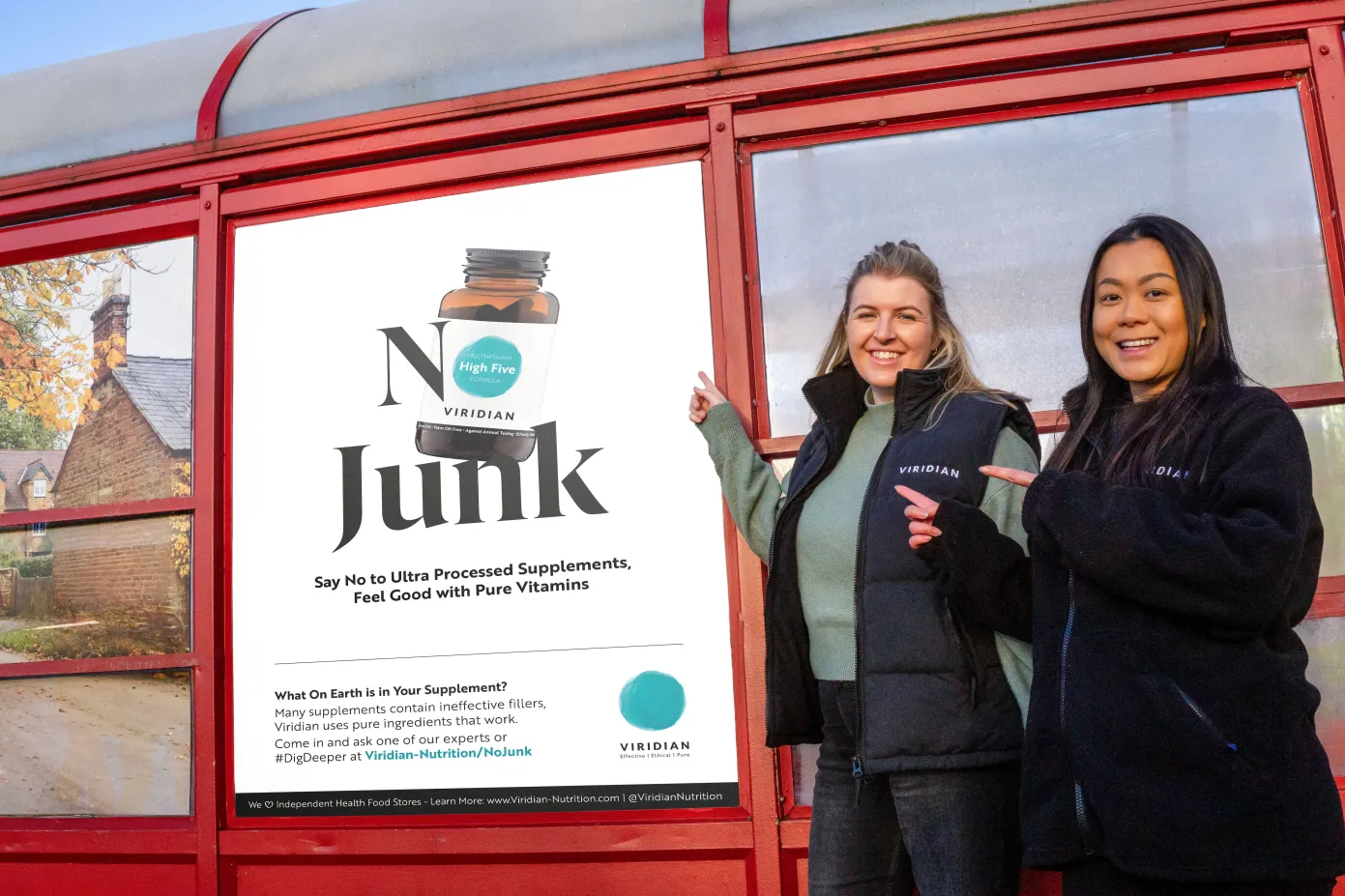Health Stores UK Partner Viridian Nutrition says it wants to shine a spotlight on hidden ultra processed ingredients and additives in food supplements with its new ‘No Junk’ media campaign, which launches this month.
Viridian says the campaign, which sets out to highlight and protect people from the impacts of a “junk filled diet and additive laden supplements”, will drive consumers into specialist health retailers and underline their role as a “vital resource championing self-care through diet and lifestyle”.
The campaign, running throughout February, March and April, encompasses widespread major advertising, a public awareness initiative with large scale media coverage and a specially commissioned white paper commissioned entitled the Viridian Dejunk Your Life Report 2024. The extensively researched 55-page Viridian Dejunk Your Life Report is written by an independent journalist and brings together 10 experts to expose the extent of ultra processed foods (UPFs) and what the authors identify as ‘not so healthy’ supplements.
The initiative will include a national advertising campaign including ads on London buses and underground, bus shelters and train stations nationally, newspapers and magazines, podcasts and social media.
Spreading the word
A range of bespoke No Junk store marketing materials featuring the eye-catching campaign logo on posters, and banners will be available to support health retailers joining the campaign.
Viridian founder and managing director, Cheryl Thallon, said: “It’s very worrying how much ultra processed food is being promoted and consumed and how vitamins containing additives like titanium dioxide, aspartame and carrageenan can call themselves healthy. I’m extremely concerned about the health of this generation and the next, and its impact on emergency health care and hospital waiting lists.
“That’s why, at Viridian, we’ve commissioned a body of research followed by a national campaign to encourage people to rethink their diet and lifestyle, read the labels and to dig deeper into their nutritional choices – in particular by heading to their local independent health store”.
Confusion over UPFs
The extent of the knowledge gaps among consumers about UPFs is revealed in a survey commissioned by Viridian for No Junk. Two thirds of consumers still don’t know how to spot ultra processed foods or artificial ingredients in their supplements, according to a survey of 2,000 consumers. Three-quarters of people think they consume less UPFs than they do and that 3 out of 5 can’t identify a UPF from its label.
As well as being unclear about the ingredients in food, Viridian says there is even more confusion about what is in supplements. When asked about key additives, as many as 7 in 10 don’t recognise certain unnecessary ingredients found in supplements or know if they are good or bad.
Aimee Benbow, technical director at Viridian has reviewed the evidence, she said: “Titanium dioxide is a prime example of an excipient which is a commonly mined compound that gives tablets and capsules their uniform colour. It has been classified by the World Health Organisation (WHO) as a possible carcinogen and in January 2022, the EU banned it as a food additive. However, in the UK, it is worryingly still found in medicines, supplements and many foodstuffs.”
‘Excipients to avoid’
Viridian’s new report contains a list of 15 “excipients to avoid”, drawn up by experts who contributed to it.
Benbow said: “Taking supplements daily can help support nutritional gaps in people’s ultra processed diets. However, they need to watch out for preservatives, glues, binders, fillers and other ingredients of no use to the body – known as excipients. These add to people’s ultra processed intake.”
UPFs disguised as healthy
In the section on ultra processed food, the report explains how different levels of processing impact the nutritional profile of packaged food products and are graded using the NOVA classification system, from non- or minimally processed to ultra processed. The report offer guidance on how to spot a UPF, and also warns about UPF disguised as healthy. Here, claims such as ‘high protein’ our ‘gluten-free’ can distract consumers from UPF ingredients, creating a dubious ‘health halo’. Protein powders and bars, ‘healthy’ snack bars and cereals, and savoury snacks, such as reduced fat crisps, or those made from lentils or chick peas, are among products that should be checked for the presence of emulsifiers and e-numbers, the report suggests.
To download a copy of the Viridian Dejunk Your Life Report 2024 click here:
